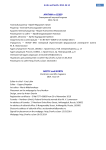Статьи журнала - Arctic and North
Все статьи: 972
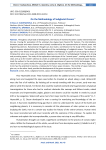
On the methodology of subglacial oceans
Статья научная
Throughout all periods of development, the history of mankind has been closely intertwined with the sea. Craving for perception of the unknown has always been favored for humans. The interrelations between people and water element were actively considered by the representatives of natural, exact and engineering sciences. Humanitarian thought can also make a contribution to the study of the oceans. The authors propose substantiation for the formation of the methodology of subglacial oceans. The methodology refers to the theory of thought and action. Modern methodology is capable of constructing the ways of thinking that solve new issues and problems. Openness to criticism of methodological thinking is its strong and promising aspect. The study of the exploration techniques of the “second space”, starting with the first steps and up to the modern attempt to create an underwater prototype of the International Space Station, leads the authors to the conclusion about the possible equivalence of space and Arctic technologies. Exploration of the ice cosmic worlds of Pluto, Jupiter and Saturn may precede the study of the Arctic region. The Arctic has the potential to become a testing site for future space missions. The sterility of space technologies can, on the other hand, provide the development of the green economy in the Arctic.
Бесплатно
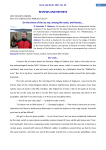
On the shore of the icy sea, among the rocks, and forests...
Статья научная
The article is devoted to the author’s trip to the village of Gridino (Northern Karelia, Russia). Oboimov A.P. tells about the life of the employees of the local weather stations, peculiarities of lifestyle of Pomor villages and the beauty of the Northern nature. The article is accompanied by a series of landscape and portrait photos.
Бесплатно
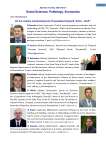
On the сreation and de-velopment of specialized shipyard “Arctic – Shelf”
Статья научная
The article proposes the concept of a specialized shipyard business project, geographically dispersed within the boundaries of the Arkhangelsk agglomeration, which aims to develop production cooperation, existing competencies and technologies in the creation of the Arctic marine equipment and vessels.
Бесплатно
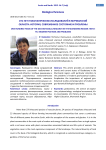
Статья научная
This article provides an overview of trends and current status of Geobotany in the Murmansk region, with particular attention to the problems of modern geo-botanical studies. Emphasizes the importance of regional geo-botanical studies and preparation of students of geo-botanical biological specialties.
Бесплатно
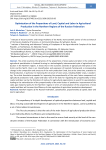
Статья научная
The article examines the dynamics of the proportions of land, capital and labor in the context of agricultural specialization in livestock farming in a technologically interconnected cycle of agricultural production in the Northern regions. It shows that in the economic activities of agricultural enterprises in the Arctic and the North, there is an intensification and expansion of livestock farming and a corresponding change in the composition and structure of the main production funds, but at the same time, attention to field production, in particular to improving the structure of sown areas, including fodder crops, is weakening. The article formulates proposals for improving the proportionality of the main factor components of agricultural production: land, capital and labor. One of the tools for regulating the proportionality of land, capital and labor can be the formation of motives for agricultural organizations to search for specializations leading to the rationalization of the proportionality of the main factors of production. Improvement of the state agro-industrial policy for the Northern regions in terms of rationalization of the proportions of land, capital and labor will increase the efficiency of state regulation of agricultural production development.
Бесплатно
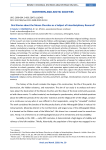
Oral stories about the Mezen churches as a subject of interdisciplinary research
Статья научная
The article analyzes oral narratives about the destruction of Orthodox religious buildings. Sources of the research are tests recorded during the folklore-anthropological expeditions of the Northern (Arctic) Federal University in the Mezen district of the Arkhangelsk Oblast (2009-2018). By the beginning of the 1930s, in Russia, the concept of “militant atheism” took shape and was approved, based on the idea of the counter-revolutionary meaning of religion and the anti-Soviet activities of believers. The object of our research is interdisciplinary. It is the subject of the study for oral history, folklore, social and cultural anthropology, and sociology. The sacrilege narratives are considered not so much as folklore or historical source, but as “a component of a local text ... whose function is not to “reflect”, but to “create” urban history, mythology, set the parameters for local identity.” A metanarrative is represented by the memories of the Mezen residents about the destruction of churches and the persecution of people for religious beliefs. It includes stories with the motives of dropping bells, punishment for the destruction of a church; desecration of cemeteries, the destruction of icons, the salvation of church property by the villagers, the conversion of churches to schools, granaries, clubs or stables, and repression against priests and parishioners. The research allows tracing the dynamics of mass representations. There was a gap in the cultural memory of the Mezen residents. The Mezen religious stories testify that, in the cultural memory of the Mezen, they were supplanted to the periphery and replaced by the Soviet period values.
Бесплатно
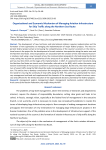
Статья научная
The development of new territories and international relations requires modernization and the formation of new approaches to managing the implementation of major federal projects. The most important federal project aimed at increasing the competitiveness of the country’s economy in the international arena is the project for the development of transit container transportation along the water area and the Northern Sea Route. Great expectations are associated with the creation of new international economic relations, built using a new transport artery, the communication along which is formed along the shortest route, taking into account the peculiarities of the structure of our planet. The implementation of the project has clear time limits on the stages of its implementation. In 2027, it is planned to start movement along the Northern Sea Route sea transit route (hereinafter referred to as the NSR), which unites the eastern and western extremities of the Eurasian continent in autonomous navigation. By this time, the entire infrastructure of vessel traffic along the NSR should be ready and equipped with the necessary means of communication. This article aims to develop a mechanism for managing the aviation infrastructure capable of meeting the needs for ensuring the continuity of ship traffic along the NSR. The author has systematized the necessary management methods and supplemented the elements of the management subject structure, necessary and sufficient for the timely execution of the organizational decisions planned by the federal program.
Бесплатно
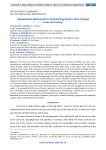
Organizational mechanisms for implementing Russia's Arctic strategy in the 21st century
Статья научная
The Arctic in the 21st century remains a popular topic in the natural-scientific, economic, socio-humanitarian and political spheres. The relevance of studying the Arctic is determined by the fact that in recent decades, deep and irreversible transformations have taken place in this region, and a full understanding of the causes and consequences of which for the economy and environmental management has not yet developed. As a result of climate change and globalization, there is a growing interest in the Arctic macro-region on the part of many foreign countries that developed strategies and programs for the development of national Arctic zones at the beginning of the XXI century. Against the background of global competition for resources and transport communications, it seems relevant to analyze the features of the development of Russia's state policy for managing the Arctic zone of the Russian Federation in the XXI century. The article analyzes the mechanisms of implementation of Russian state policy in the Arctic based on the strategic planning system and reveals the bottlenecks in the system of state management of the Arctic region. It is concluded that the core of Russia's policy in the Arctic is innovative modernization that can ensure sustainable socio-economic development, infrastructure development, rational use of natural resources, protection of local ecosystems and development of indigenous communities.
Бесплатно
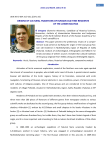
Origins of Cultural Traditions of Russian Old‐time Residents of the Lower Kolyma
Статья научная
This paper presents the preliminary results of a comprehensive study aimed at clarifying the origin of the local group Russian old residence in Nizhekolymskiy region of Republic of Sakha (Yakutia). Analysis of archaeological, ethnographic and folklore materials and datas of written sources revealed that cultural traditions of this group originate from Velikiy Ustiug and Arkhangelsk regions.
Бесплатно
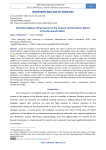
Orthodox Religious Infrastructure in the Tourism and Recreation Sphere of the Murmansk Oblast
Статья научная
Using the example of the Murmansk Oblast, the article analyzes the functioning of religious tourism within a region located in the conditions of the Polar and Subpolar areas. The region is considered as an example of the development of this direction of recreational economy, within which almost all objects of religious infrastructure, acting as the main objects of excursion display on thematic tourist routes, were lost during the Soviet period. A differentiated approach is used to apply the calculated coefficient of territorial concentration in order to identify the features of the placement of functioning monasteries, temples, and chapels. Their high concentration within certain areas of the Murmansk Oblast is recorded. On this basis, as well as on the basis of the analysis of the composition of the main thematic routes offered on the market, the following religious tourism clusters are proposed to be identified — Murman-Kolskiy, Tersko-Beregovoy, and Pechengskiy. The main conclusion of the article is that the role of religious objects in the implementation of educational routes throughout the Murmansk Oblast is significant, and religious tourism within its borders not only operates despite the high dispersion in the placement of monasteries and temples, as well as the losses of the Soviet period, but also has prospects for the introduction of innovative forms.
Бесплатно
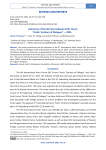
Outcomes of the 6th International Arctic Forum “Arctic: Territory of Dialogue” — 2025
Статья научная
The article summarizes the key outcomes of the 6th International Arctic Forum (IAF, the Forum) “Arctic: Territory of Dialogue”, held in Murmansk on March 26–27, 2025. The IAF became a platform for international dialogue on such issues as development of the Northern Sea Route, enhancing investment and entrepreneurial potential in the Arctic Zone, as well as environmental, humanitarian, and cultural cooperation. The Forum primarily focused on discussions of the state policy in the Arctic Zone of the Russian Federation (AZRF), aimed at the comprehensive development of the Far North and improving the well-being of the region’s residents.
Бесплатно
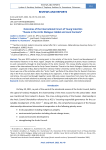
Статья научная
The year 2022 marked a turning point in the activity of the Arctic Council and development of international relations in the Arctic region. Despite the challenging geopolitical situation, Russia continues to work consistently through its chairmanship of the Arctic Council. This review briefly presents the outcomes of the International Forum for Early-Career Scientists “Russia in the Arctic Dialogue: Global and Local Contexts”, organized in May 2022 at Northern (Arctic) Federal University named by M.V. Lomonosov. The Forum was one of the activities within the “Arctic Youth” portfolio of the Action Plan for Russia’s Chairmanship in the Arctic Council 2021-2023. According to its organizers, in face of the global tensions and current restrictions, the event had brought together nearly 100 early-career researchers from more than 20 countries to discuss and seek solutions to pressing issues of development and exploration of the Arctic region.
Бесплатно
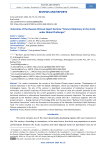
Статья научная
The review summarizes the results of the Russian-Chinese expert seminar “Development of Science Diplomacy in the Arctic under the Global Challenges”, which was organized in December 2023 in Arkhangelsk, Russia. The aim of the seminar is described: accumulation of intellectual resources of universities and scientific institutes of Russia and China. The need to unite the scientific potential of the two countries is determined by the current geopolitical context, in which the development of relevant functional solutions to international humanitarian issues becomes extremely important. The seminar was organized by the Northern (Arctic) Federal University named after M.V. Lomonosov together with the project partners — Beijing Institute of Technology (PRC) and the Association “National Arctic Scientific and Educational Consortium” within the framework of the project of the Alexander Gorchakov Public Diplomacy Fund. The event resulted in a final document (recommendations) on further development of Russian-Chinese cooperation in the Arctic.
Бесплатно

